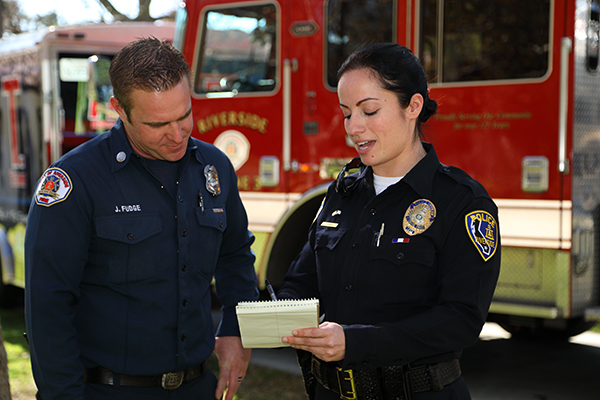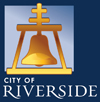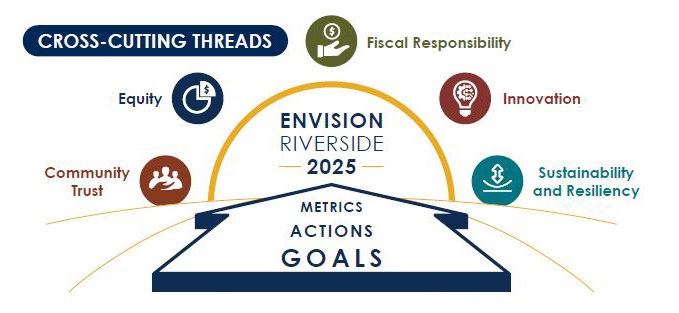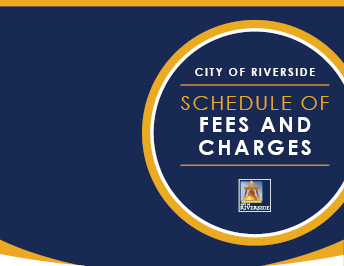Riverside User Fees and Charges Study
Published: 05/10/2022
RIVERSIDE USER FEES & CHARGES STUDY
Welcome to the City of Riverside’s User Fees & Charges Study project site.
Fee studies help manage the City's growth-related fiscal challenges by aligning supply and demand, reducing subsidization, setting realistic expectations for cost recovery, properly funding needed programs, and creating greater transparency within the community for citywide services.
Here you will find the latest information regarding project news, status, upcoming community outreach events, timelines, and other valuable resources to track progress as we consider important updates to our user fees, charges, and services provided to our community.

Completed Comprehensive User Fee Study
The last comprehensive update to the City’s user fees and charges was approved in September 2015. In January 2021, the Finance Department issued a Request for Proposal (RFP) to prepare a new comprehensive fee study. In May 2021, MGT of America Consulting, LLC was engaged to conduct the update. The study aimed to determine the actual cost of providing City services and support informed policy decisions on fees. In early 2022, the fee study was paused due to changes in leadership. In June 2023, the City Council adopted the Fiscal Year 2023/24 Master Fees and Charges schedule with a 7.5% CPI increase to account for inflation and to mitigate anticipated increases in fees resulting from a fee study.
In the summer of 2023, the Finance department updated the study with Fiscal Year 2023/24 budget data, providing a basis for Fiscal Year 2024/25 user fee policy decisions. During April and May 2024, valuable public feedback was gathered and incorporated into recommended fee adjustments. On June 11, 2024, the Comprehensive User Fees and Charges Study prepared by MGT of America Consulting, LLC, was presented to the City Council for review and input, as well as public comment. Subsequently, on June 25, 2024, the Fiscal Year 2024/25 Master Fees and Charges Schedule was presented to the City Council during a public hearing at a regularly scheduled council meeting and adopted.
Fiscal Year 2024/25 User Fee Study Report
Note: Developer fees were not included in the Fiscal Year 2024/25 User Fee Study. The user fee study related to developer fees requires more in depth analysis to conduct a review of enhancing customer service while concurrently analyzing required fee levels for cost recovery. The City’s goal is to complete the study for developer fees and present updated fees to Council for adoption during Fiscal Year 2024/25.
What are User Fee & Charges?
The State Constitution allows cities to charge user fees and regulatory fees for specific services and activities provided directly to individuals and businesses. However, these fees cannot be more than the estimated reasonable cost of providing those services or performing those activities.
In a growing city, it’s crucial to fund essential services fairly and efficiently. One way local governments do this is by using user fees and charges. These fees are part of a broader strategy to recover costs for programs and services that directly benefit individuals or businesses requesting a specific service. For example, if a business needs a special permit, the fee they pay helps cover the cost of processing that permit.
Using user fees reduces the need to rely on the General Fund, which is mostly funded by all taxpayers. The General Fund is often under pressure due to the high demand for services and fluctuating funding. Ideally, the money in the General Fund should be used for public benefits that everyone enjoys, rather than subsidizing services for specific individuals or businesses.
By charging user fees, cities can ensure that those who use specific services pay for them, which helps make sure that community funds are used efficiently and fairly. This approach gives cities more control over recovering costs and ensures that taxpayer money is spent wisely.
What is a User Fees & Charges Study?
A User Fees & Charges Study is a review of the City’s existing fees for services excluding rate-based fees like electric, water, refuse, sewer, and parking. The study involves multiple Departments and identifies the cost of providing services and comparing the result to the current fee amount to determine whether it’s recovering the full cost of the service provided. The fee study also provides an opportunity to add new fee recommendations or remove outdated fees or services.
A comprehensive user fees and charges study is typically performed by local governments every three to five years, offering several benefits:
- Cost Recovery and Equity: Over time, service delivery costs can fluctuate due to inflation, changes in resource needs, regulatory changes, shifts in demand, or other factors. Conducting a fee study ensures user fees accurately reflect the current cost of providing the service, thereby promoting fairness and responsible fiscal management by reducing subsidization from general purpose revenue sources. From an equity perspective, this user-pays principle ensures that those requesting and benefiting from the service contribute directly to its cost. While the study aims to optimize City revenue, it also considers broader City goals and values, ensuring that fee adjustments also align with those objectives.
- Efficiency and Streamlining: Fee structures can become complex over time. A fee study allows for an objective review and identification of opportunities to streamline the system for both users and City administration. This can involve consolidating fees, simplifying billing processes, or eliminating outdated charges.
- Transparency and Public Trust: Regular fee studies demonstrate transparency and responsible fiscal management to the public. The fee study process includes opportunities for public input, fostering trust and understanding of how user fees are determined.
The City’s Finance Department leads fees studies and may engage a professional consultant with expertise in performing fees studies to determine the City’s full costs for each of the services the City provides. Costs for services include costs of labor and materials, contracts and licenses, maintenance or replacement of equipment, vehicles and facilities, office supplies, utilities and more.
Scope of this Fee Study
The scope of this study encompasses a review and calculation of the user fees listed in the existing Master Fees and Charges Schedule and charged by the following City of Riverside Departments:

- City Clerk
- Community & Economic Development (Building, Planning, and Code Enforcement)
- Finance
- Fire
- Library
- Parks, Recreation and Community Services (including Arts & Culture Affairs Division)
- Police
- Public Works (excluding Public Parking)
The Museum of Riverside is currently closed for renovation; Museum fees will be reviewed and adjusted when the Museum reopens.
Community and Stakeholder Engagement
The City Council, Mayor and City staff are committed to engaging Riverside’s community in a meaningful, accountable, responsive, and equitable way. Community engagement is defined as the range of opportunities for public involvement in the decision-making process, relationship building, and community strengthening. Community engagement is achieved when the community is and feels a part of a process.
Community engagement processes support the delivery of all outcome areas identified in the Envision Riverside 2025 Strategic Plan. Examples of engagement through the User Fees & Charges Study process will include general overview workshops, focused topic workshops with key stakeholders (i.e. development fees, recreational user fees, etc.) and other meetings as requested. The term “stakeholder” defines community groups or individuals who are directly impacted by, involved with, or interested in, the City’s decision-making, relationship building or community strengthening process.
The City will hold a series of workshops and focus group discussions to gather stakeholder feedback, which will ultimately be incorporated into staff’s recommendations to City Council prior to fee adoption. Sign up below to receive workshop notifications and the latest updates from the Fees and Charges Study.
Who Participates in the Project?
The Finance Department leads this collaborative citywide project; however, each department’s fees, services and stakeholders are unique. Therefore, subject matter experts (SMEs) from each Department are included as a part of the comprehensive project team. In support of the Finance Department, the consultant and each Department’s SME will be available to help answer any questions while also attending public meetings throughout the engagement process.
For questions or comments please contact:
[email protected]
(951) 826-5454
Terms to Know
A user fee is a fee charged to the user for a service (such as the issuance of a building permit or a business license) provided by a government agency when the cost of providing that service, and the benefits that service provides, are mainly attributed to that specific person or user. The fee is typically based upon the cost the agency incurs in providing the service but may be set at less than the full cost of providing the service for practical or policy reasons.
If the fee is set at a rate lower than the cost of providing the service, then the difference must be covered, or subsidized, by general government revenues like taxes. In some cases, like the Library and Parks, Recreation and Community Services Departments, these services provide broad public benefits and improve the quality of life and thus may be set below the cost of recovery. Other services, particularly development-related fees like building permits and entitlements, mainly benefit those seeking the services and, in general, should be set to full cost recovery.
When governments use general revenues like taxes to pay for services that mainly provide private benefit to individuals (and therefore constitute a subsidy), this limits funds that can be used to provide other community-wide benefits. In effect, the government would be using community funds to pay for private benefit.
Charging users for services that provide private benefit to recover the cost of providing such service ensures general revenues remain available for community-wide needs.
The basic concept of a User Fee Study is to determine the “reasonable cost” of each service provided for which the City charges a user fee. The full cost of providing a service may not necessarily become the user fee, but it serves as the objective basis as to the maximum amount that may be collected.
In California, user fees are required to conform to the statutory requirements of the California Constitution, Proposition 218, and the California Code of Regulations. The law also requires that the City Council adopt fees by either ordinance or resolution, which is an act of local lawmaking. Any fees set higher than the estimated total cost of providing the related services must be approved by a popular vote of two-thirds of voters because the charge would then be considered a tax and not a fee.
The User Fees and Charges study is consistent with the City’s Strategic Plan. The study supports cross-cutting threads of “Fiscal Responsibility”; “Sustainability and Resiliency”; “Equity”; and “Community Trust”; as well as the “High Performing Government” strategic priority and goal 5.4: Achieve and maintain financial health by addressing gaps between revenues and expenditures and aligning resources with strategic priorities to yield the greatest impact.
The fee study also includes a survey that compares similar fees charged by other local government agencies around Southern California. The purpose of the comparative study is to help identify cost similarities and differences between agencies. This information provides additional data to help make informed decisions about proposed fee adjustments, cost allocation, and the resulting effect on City revenue. The following cities or counties were selected for the comparison study based on their proximity, similarity of operations, demographics, size, and degree of urban development:
Comparisons will include various development related fees as well as community service fees to the greatest extent possible.

- City of Anaheim
- City of Corona
- County of Riverside
- City of Long Beach
- City of Moreno Valley
- City of Pasadena
Frequently Asked Questions
As the City of Riverside seeks to efficiently manage limited resources and adequately respond to increased service demands, it needs a variety of tools. These tools provide assurance that the City has the best information and the best resources available to make sound decisions, fairly and legitimately set fees, maintain compliance with state law and local policies, and meet the needs of the City administration and its constituency.
The City recognizes that a User Fee Study is a cost-effective way to understand the total cost of services and identify potential fee deficiencies. Essentially, a User Fee is a payment for a requested service provided by a local government that primarily benefits an individual or group. The total cost of each service included in this analysis is based on the reasonable full cost of providing City services, including direct salaries and benefits of City staff, direct departmental costs, and indirect costs from central service support. This study determines the full cost recovery fee for the City to provide each service; however, each fee is set at the City’s discretion, up to 100% of the total cost.
The principal goal of the study is to help the City determine the full cost of the services that the City provides. In concert with that goal, MGT established a series of additional objectives including:
- Developing a rational basis for setting fees;
- Identifying subsidy amount, if applicable, of each fee in the model;
- Ensuring compliance with State law;
- Developing an updatable and comprehensive list of fees; and
- Maintaining accordance with City policies and goals
The study results will help the City better understand its true costs of providing services and will serve as a basis for making informed policy decisions regarding the most appropriate fees, if any, to collect from individuals and organizations that require individualized services from the City.
City Departments – Those providing the service and collecting the fee
Customers – Those receiving and paying for the service, including the business community, developers, and community at large. Includes various community groups, such as the Chambers of Commerce.
City residents – Evaluating fee subsidies from general revenues results in less funding for other necessities, such as park maintenance, library services, and public safety.
City Council – Responsible for approval of fee updates and policy setting for fees and any applicable fee subsidies. Policy considerations for establishing full cost recovery or fee subsidies include, but are not limited to: economic development, visibility of the service to the community, desire to subsidize a certain product or service and to remove barriers.
City boards & commissions – Boards and commissions like the Board of Library Trustees, Park and Recreation Commission, and Budget Engagement Committee will review and make recommendations about the fees to the City Council.
The City intends to conduct extensive community outreach on this topic in alignment with the Draft Community Engagement Policy which will be considered by the City Council in the near future. A series of workshops and focus groups will be conducted to share the purpose of the study, review existing fees and preliminary fee recommendations, and gather stakeholder feedback, which will ultimately be incorporated into staff’s recommendations to City Council prior to fee adoption. The hybrid workshops (virtual and in person) will also provide a forum for the community to offer ideas about how to simultaneously enhance the competing needs of cost recovery, equity, and accessibility – particularly with parks, recreation, and library fees.
Workshop dates and times will be posted as they become available.
Sign up below to receive workshop notifications and the latest updates from the Fees and Charges Study.
Residents, customers, developers and stakeholders are strongly encouraged to participate in public meetings or provide comments to the Project Lead.
[email protected]
(951) 826-5454



